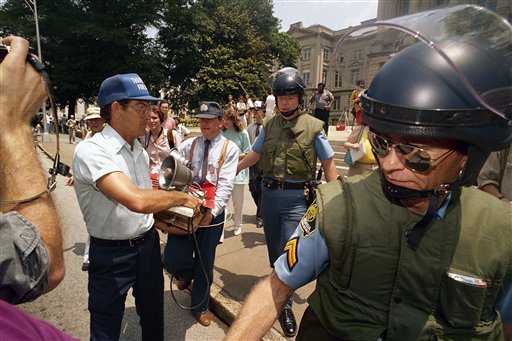In Forsyth County, Georgia v. Nationalist Movement, 505 U.S. 123 (1992), the Supreme Court established limits for city permitting schemes in ruling that a county’s ordinance violated the First Amendment.
County ordinance varied costs of obtaining protest permits
In 1987 after a large and expensive civil rights march, Forsyth County, Ga., officials passed an ordinance that allowed its administrator to vary the costs of obtaining a permit based on the expenses the county might incur in maintaining public order.
In January 1989, the Nationalist Movement, a white supremacy group, planned to march in opposition to a federal holiday for Rev. Martin Luther King Jr. When the county administrator announced the cost of the permit for the march, the Nationalist Movement refused to pay it and challenged its constitutionality. A federal district court upheld the ordinance, but the 11th U.S. Circuit Court of Appeals reversed, reasoning that the ordinance unconstitutionally limited speech in a public forum.
Court said ordinance violated the First Amendment
On appeal, the Supreme Court ruled 5-4 that the ordinance violated the First Amendment.
Justice Harry A. Blackmun, who authored the majority opinion, noted that the ordinance vested unbridled discretion in the hands of the county administrator of how much to charge for police protection. Blackmun relied on a number of Court precedents, including Freedman v. Maryland (1965), which established that city permitting and licensing schemes must provide sufficiently clear standards and not give government officials unbridled discretion.
Blackmun also determined that the ordinance was fatally flawed because it allowed city officials to charge more for a permit according to their assessment of whether a group’s speech would engender a hostile response. “Speech cannot be financially burdened, any more than it can be punished or banned, simply because it might offend a hostile mob,” he wrote.
Dissenters thought cities could charge applicants more than a nominal fee
Chief Justice William H. Rehnquist, who wrote for the four dissenters, contended that the issue before the Court was whether cities could charge permit applicants more than a nominal fee for speech in a public forum.
He said the Court’s decision in Cox v. New Hampshire (1941) authorized such a result. Rehnquist criticized the majority for “reaching out” and deciding other constitutional issues surrounding the permitting scheme that had not been addressed by the lower courts.
David L. Hudson, Jr. is a law professor at Belmont who publishes widely on First Amendment topics. He is the author of a 12-lecture audio course on the First Amendment entitled Freedom of Speech: Understanding the First Amendment (Now You Know Media, 2018). He also is the author of many First Amendment books, including The First Amendment: Freedom of Speech (Thomson Reuters, 2012) and Freedom of Speech: Documents Decoded (ABC-CLIO, 2017). This article was originally published in 2009.

